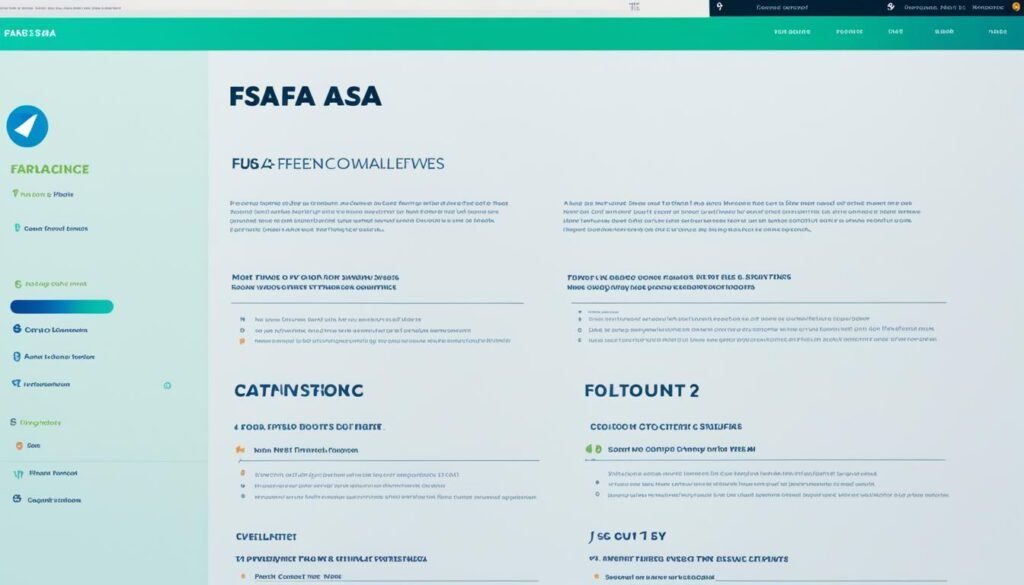The Continents States University works tirelessly to equip future professionals with the skills, tools, and opportunities that enable faster integration into the workforce industry around the globe. By delivering affordable, quality, and competency-based education to everyone across the continents, the university is committed to empowering students and helping them achieve their academic and career aspirations.
The Free Application for Federal Student Aid (FAFSA) is a crucial document for students seeking financial assistance for college. The FAFSA deadline for the 2023-2024 academic year is June 30, 2024. This means that students had from October 1, 2022 until June 30, 2024 to file their FAFSA application for the 2023-2024 school year. The FAFSA is required to be considered for federal financial aid, as well as many state and institutional aid programs. Missing the FAFSA deadline can result in students missing out on valuable financial aid opportunities.
Key Takeaways
- The FAFSA is a critical application for accessing financial aid for college.
- The 2023-2024 FAFSA deadline is June 30, 2024, with the application window opening on October 1, 2022.
- Missing the FAFSA deadline can lead to missed opportunities for valuable financial aid.
- Students should prioritize filing the FAFSA to ensure they are considered for federal, state, and institutional aid programs.
- The Continents States University is committed to providing affordable, quality education to students across the globe.
Understanding the FAFSA and Its Importance
The FAFSA, or the Free Application for Federal Student Aid, is a crucial document for college-bound students seeking financial assistance. This form is used to apply for various types of federal student aid, including grants, scholarships, work-study programs, and student loans. Filing the FAFSA is a vital step in the college financial aid process, as it determines a student’s eligibility for these valuable resources.
What is the FAFSA?
The FAFSA is a comprehensive form that collects information about a student’s and their family’s financial situation. This data is then used to calculate the expected family contribution (EFC), which is the amount the student and their family are expected to pay towards the cost of college. The FAFSA is required by the federal government, as well as most state governments and colleges, in order to distribute financial aid funds.
Why is it crucial to file the FAFSA?
Filing the FAFSA is essential for students seeking to access federal student aid, including Pell Grants, Federal Work-Study, and federal student loans. Additionally, many states and colleges use the FAFSA to determine eligibility for their own financial aid programs, such as state grants and institutional scholarships. By completing the FAFSA, students can maximize their chances of securing the financial assistance they need to make college more affordable.

Key Deadlines for the 2023-2024 Academic Year
As students and their families begin the process of securing financial aid for the upcoming academic year, it’s crucial to be aware of the various deadlines associated with the FAFSA (Free Application for Federal Student Aid) and other financial aid programs. While the federal FAFSA deadline is June 30, 2024, many states and individual colleges have earlier deadlines that students must meet to be eligible for state-based and institutional aid.
Federal FAFSA Deadline
The federal FAFSA deadline for the 2023-2024 academic year is June 30, 2024. This deadline applies to students seeking federal financial aid, including grants, loans, and work-study programs. It’s important for students to submit their FAFSA as early as possible to maximize their chances of receiving the maximum amount of aid they are eligible for.
State and College-Specific Deadlines
In addition to the federal FAFSA deadline, students must also be mindful of state financial aid deadlines and college-specific financial aid deadlines. For example, the state of California has a FAFSA submission deadline of May 2, 2024 for students to be eligible for state-based financial aid, including the Cal Grant. Similarly, many colleges and universities have their own financial aid application deadlines, which can vary significantly from the federal FAFSA deadline. By researching and meeting all relevant deadlines, students can increase their chances of receiving the financial assistance they need to pursue their educational goals.

Financial aid application deadline fall semester
The financial aid application deadline for the fall 2023 semester is a critical deadline for students to keep in mind. The Free Application for Federal Student Aid (FAFSA) must be filed by June 30, 2024 to be considered for federal financial aid, such as grants, loans, and work-study programs, for the fall 2023 term.
While the federal FAFSA deadline is June 30, 2024, it’s important to note that many states and colleges have earlier deadlines. Students should research and meet all relevant financial aid application deadlines to maximize their chances of receiving the maximum amount of college financial aid possible for the fall 2023 semester.
Submitting the FAFSA early is highly recommended, as it can increase a student’s eligibility for various forms of financial assistance, including institutional aid from their college or university. By filing the FAFSA before the deadlines, students can ensure they are considered for the full range of financial aid options available to them for the fall 2023 academic term.
Early FAFSA Filing: Maximizing Your Chances
Applying for college financial aid can be a daunting task, but getting an early start can significantly improve your chances of securing the best possible financial aid package. One of the most crucial steps in the process is filing the Free Application for Federal Student Aid (FAFSA) as soon as possible.
Benefits of Applying Early
By submitting your FAFSA early, typically starting on October 1 of the year prior to the academic year you are seeking aid for, you’ll be positioning yourself for the best opportunity to receive grants, scholarships, and other financial aid opportunities. Many of these funds are awarded on a first-come, first-served basis, so the sooner you file, the better your chances of accessing them.
Avoiding Missing Out on Aid
In addition to the federal FAFSA deadline, there are also state and college-specific financial aid deadlines that can vary widely. By filing the FAFSA early, you’re less likely to miss out on these state and institution-based aid opportunities, which can often come much earlier than the federal deadline. This can make a significant difference in the overall financial aid package you receive for your college education.
Remember, the key to maximizing your chances of securing the best financial aid is to start the process as early as possible by filing your FAFSA. This simple step can open the door to a world of college financial aid opportunities, helping you achieve your educational goals without the burden of overwhelming debt.

Navigating the Simplified FAFSA Process
The FAFSA application process has undergone significant changes in recent years, aiming to make it more accessible and user-friendly for students and families. One of the key developments is the simplification of the FAFSA form, reducing the number of questions from over 100 to fewer than 50. This streamlined application process helps alleviate the burden of filling out the lengthy form, making it easier for applicants to navigate and complete the necessary information.
Another important change is the introduction of the Student Aid Index (SAI), which has replaced the previous Expected Family Contribution (EFC) metric. The SAI provides a more accurate assessment of a student’s financial need and eligibility for financial aid eligibility. This new system aims to better reflect a family’s ability to contribute towards the cost of education, ensuring a more equitable distribution of financial aid.

These changes to the simplified FAFSA application and the new SAI calculation are designed to simplify the process and make it more transparent for students and families. By reducing the complexity of the form and providing a more accurate assessment of financial need, the FAFSA process has become more user-friendly and accessible, allowing more individuals to take advantage of the available financial aid opportunities.
Preparing for the FAFSA: Documents Needed
Completing the Free Application for Federal Student Aid (FAFSA) is a crucial step in securing financial aid for college. To ensure a smooth FAFSA preparation process, it’s essential to gather the necessary documents in advance. By having these FAFSA documents on hand, students and their families can streamline the financial aid application requirements and provide accurate information.
Some of the key documents needed for the FAFSA include tax returns, W-2 forms, bank statements, and investment account information. These financial records will help you report your family’s income and assets accurately, which is a critical factor in determining your eligibility for various types of financial aid, such as grants, scholarships, and student loans.
Preparing these FAFSA documents ahead of time can save you time and stress when it’s time to complete the application. Gathering and organizing the necessary information beforehand can also help you avoid common mistakes or missing information, which can delay the processing of your financial aid application.
By taking the time to prepare for the FAFSA, you’ll be well on your way to maximizing your chances of receiving the financial assistance you need to pursue your educational goals. Remember, the FAFSA deadline is just around the corner, so it’s important to start gathering your documents and getting ready to submit your application as soon as possible.
Special Circumstances and Aid Reassessment
Navigating the financial aid process can be complex, but there’s good news – if your financial situation has changed since you last filed the FAFSA, you may be able to request a reassessment of your aid eligibility. This is especially important if you’ve experienced a significant change in employment, income, or other financial factors that could impact your ability to pay for college.
Reporting Changes in Financial Situation
The Free Application for Federal Student Aid (FAFSA) uses information from the previous tax year to determine your expected family contribution (EFC) and eligibility for financial aid. However, if your current financial situation is drastically different from what was reported on the FAFSA, you can contact the financial aid office at your college to request a reassessment. This process is known as a FAFSA special circumstances review, and it could potentially result in an increase in your financial aid package.
Examples of financial changes that may warrant a financial aid reassessment include job loss, reduced income, unexpected medical expenses, or a change in your family’s financial situation. By proactively reporting these changes in financial situation, you can ensure that your financial aid package accurately reflects your current needs and maximizes the support available to you.
Don’t hesitate to reach out to your college’s financial aid office if your financial circumstances have changed. They are there to help you navigate the process and ensure that you receive the support you need to achieve your educational goals.
Resources for FAFSA Assistance
Completing the FAFSA can be a daunting task, but there’s no need to tackle it alone. There are numerous resources available to help students and families navigate the process and secure the financial aid they need. From free workshops to one-on-one guidance, these FAFSA assistance and FAFSA resources can make the difference in maximizing your financial aid help.
One valuable resource is the California Student Aid Commission, which offers free Cash for College Webinars and Train the Trainer workshops. These events provide step-by-step instructions and personalized support to ensure you complete the FAFSA accurately and on time. High school counselors and college financial aid offices are also excellent sources of FAFSA assistance, offering guidance throughout the entire application process.
Community organizations, such as local nonprofits and community centers, can also be invaluable FAFSA resources. These groups often host free workshops and events, connecting families with financial aid experts who can walk them through the FAFSA step by step. By taking advantage of these FAFSA assistance opportunities, you can maximize your chances of securing the financial aid help you need to achieve your educational goals.
Conclusion
The FAFSA, or Free Application for Federal Student Aid, is a crucial step in the college financial aid process. By understanding the FAFSA deadlines, preparing the necessary documents, and taking advantage of available resources, students can maximize their chances of securing the financial aid they need to make college more affordable.
It’s essential for students to file the FAFSA as early as possible to ensure they don’t miss out on valuable financial aid opportunities, such as grants, scholarships, work-study programs, and student loans. The FAFSA determines a student’s eligibility for these forms of assistance, making it a critical component of the college affordability equation.
By staying informed about the FAFSA deadline, students can take proactive steps to complete the application and unlock the financial support they need to achieve their educational goals. With the right guidance and resources, students can navigate the FAFSA process with confidence and secure the funding they need to make their college dreams a reality.
Source Links
- FAFSA Deadlines – https://www.savingforcollege.com/article/fafsa-deadlines
- FAFSA 2024: The May 2 Deadline for California Students is Almost Here | KQED – https://www.kqed.org/news/11957693/applying-for-fafsa-in-2023-will-be-different-what-to-know-including-deadlines
- When Is The FAFSA Deadline For The 2024-25 School Year? – https://www.forbes.com/advisor/student-loans/fafsa-deadline/


